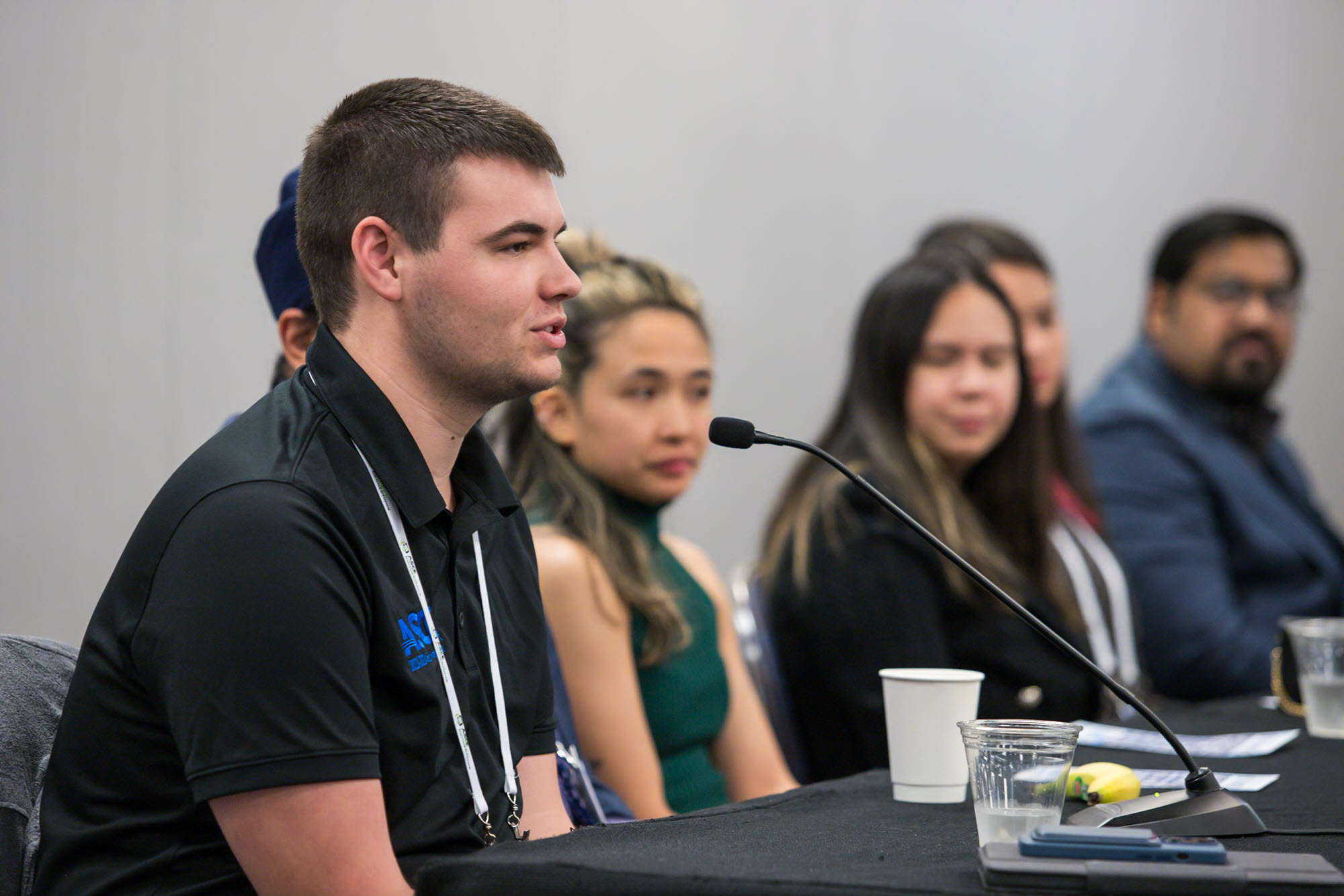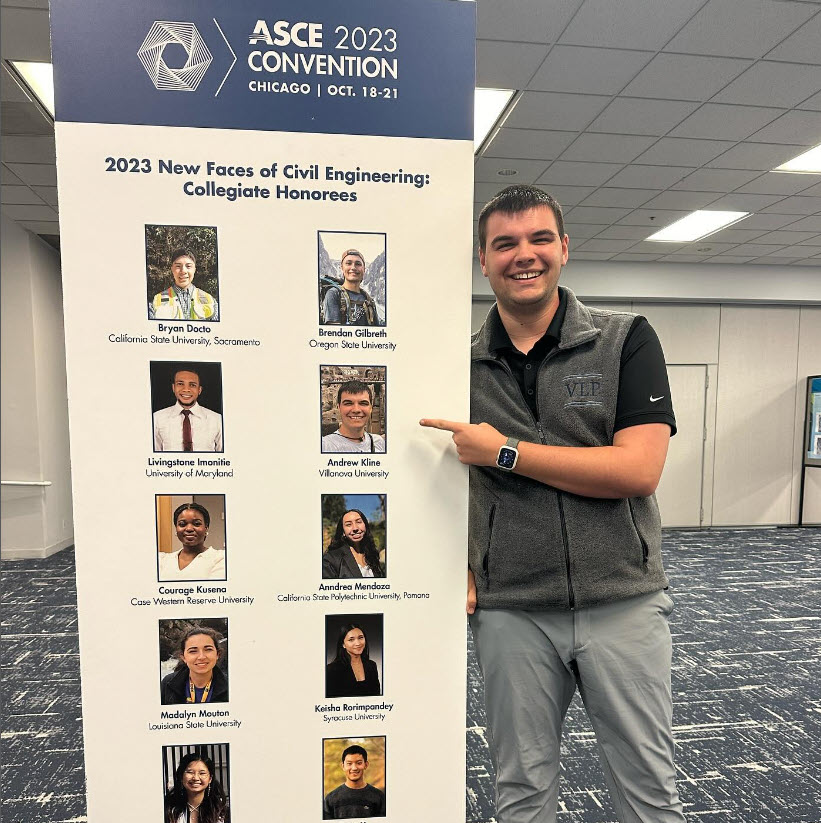 Jason Dixson Photography
Jason Dixson Photography
Let’s be clear. Andrew Kline is not your typical civil engineering student.
The senior civil engineering major at Villanova University has a resume that would suggest he’s been cloned at least four times.
Andrew Kline the ASCE New Face of Civil Engineering–Collegiate. Andrew Kline the student chapter president. Andrew Kline the three-time ASCE Student Ambassador; the Student Presidential Group president; the student representative for Region 2; the contributing member of the Board Strategic Advisory Council. He’s a busy guy.
So in no way does this article suggest everyone is like Andrew Kline. It’s simply not possible.
However, with another school year’s end approaching, it’s a good time for students to examine how best to get ready for their impending careers. And what better model than Andrew Kline?
Kline is set to graduate this spring with plans to start working full-time for Traffic Planning and Design Inc. in Pottstown, Pennsylvania, this summer.
So here is the blueprint for preparing to make the leap into the civil engineering profession from someone who has gone above and beyond.
Internships, plural
One internship can change your career. But two gives you context. In Andrew Kline’s case, he’s had three. And each gave him invaluable practical experience to take with him both at school and as he entered the profession.
“In summer 2022, I interned for the Pennsylvania Department of Transportation in the bridge unit for one of their district offices,” Kline said. “I rotated through the entire department learning design, maintenance, and inspection. Through the course of the summer, I was able to lead an underpinning project and rehabilitate a bridge that was celebrating its 101st anniversary. I really got to see beyond the topics that are brought up in class.
“Then, in January 2023, I started with Traffic Planning and Design Inc. and worked in the municipal services group. That was a mix of everything – from reviewing land development submissions to participating in a corridor study; designing some roundabouts, all sorts of creative projects.
“The preliminary conceptual stuff really allows creativity, and it was a good mix for me because it brings together my interest in government with my engineering interests.
“Over the summer, I worked for ARCO Design/Build. In the office I was in, they primarily do industrial warehouse spaces. I was assigned to a project in North Jersey, a warehouse campus. I got to see everything from the demolition of the existing structures through the start of pouring for tilt walls, which is a really cool kind of niche construction element. They pour the concrete walls on the slab and then, using a massive crane, they pick them up and set the walls in place. So the building starts as a very flat thing, and then by the end of it all the walls get pulled up and all of a sudden you have a big box.
The work with TPD led directly to Kline’s first full-time job this summer. But internships aren’t just great for professional contacts, either. They’re an increasingly vital educational tool for preparing young engineers for the workforce.
“I have definitely found that I’m a lot more of an experiential or hands-on learner,” Kline said. “Sitting in a classroom and being taught the theory of structural analysis doesn’t make that stick in my head. Seeing real-world examples is really where I learned best.”

Audition the industry
While it may seem like you’re the newcomer in the industry – because you are – it’s important to remember that you’re auditioning the profession as much as the profession is assessing you. Maybe even more so.
Civil engineering is such a broad profession that students must figure out where they fit as early as they can.
Kline viewed each of his internships through that lens.
“Multiple internships allowed me to get to see what I actually enjoy,” Kline said. “Each internship being in slightly different areas allowed me to get a feel for what I want to do postgraduation. You can shape your future career and figure out what you don’t like too.
“I discovered that working as a project manager in the construction field was not necessarily what I wanted to do. I enjoyed it, but I just didn’t think I would enjoy doing that for the rest of my life. So being able to identify that through the course of a summer as opposed to accepting a full-time job and then having to start over once I have that realization, it’s definitely a huge benefit to having that internship experience.
“The transportation opportunities I had in my internships helped me realize that that's what I want to do.”
Attend events with a loud voice
Even if it’s not your personality to seek attention, it does help to talk to people.
Kline said he’s strategic about every event he’s attended as a student – aware of who he might talk to, and subjects that might be covered. That way you’re not simply there; you’re there.
“Don’t be afraid to talk to the speaker and ask her questions,” Kline said. “You know if you have a question, there’s a pretty good chance that someone else in the room has the same question or something similar. Or your question might spark another comment or question from someone else.
“It might feel intimidating to participate in dialogue with certain people or you might be nervous to walk into a networking event and just go up to someone and introduce yourself. But you make connections that way, which leads to opportunities down the line. You never know how it might help you.”
Volunteer and say ‘Yes’
You don’t need to know anything more about Kline’s ASCE experience than this: Fall break at Villanova hit last October, and did Kline celebrate at the beach or some other party destination? I guess that depends on your definition of “party destination.” Kline spent his break at the ASCE Board of Direction meeting in Chicago.
“There were a few things that I had worked on over the previous few months that were being talked about by the board,” Kline said with zero regrets for any fall break shenanigans missed. “I wanted to be in the room to hear the questions and their feedback. And if that is something (ASCE board leadership) that I want to do in my future, getting acquainted with the process now seemed like it would be beneficial.”
Kline started with ASCE as a freshman at Villanova and, essentially, hasn’t come up for air since.
“In a way I kind of fell into a path that has led me to this point,” Kline said. “Our student chapter has a really great opportunity for first-year students to get involved first semester, so before you’ve even had a civil engineering class, applications are open to be on the ASCE executive board for our student chapter. I took that opportunity and, fortunately, was selected. And from there, I just saw that there was a lot of opportunity to move upward.
“The first Society-level thing that I participated in was the student ambassador program. I saw ASCE posting or reposting people on their Instagram stories. And I was like, ‘I wanna do that! I want to have my name out there like that.’
“Just so many opportunities like that opened doors for another opportunity and another opportunity and all the connections you make along the way. I’m really trying to take advantage of the opportunities that are being created for students right now. It’s a great time to be a student in ASCE.”
Learn more about ASCE’s resources for civil engineering students.



